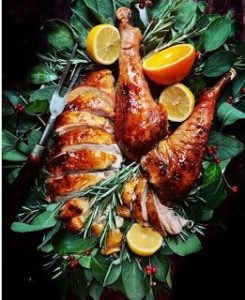How to Butterfly the Bird
Scoot over Norman Rockwell, there’s a new tradition in town.
BY TOM YATES
With friends and family gathered around the holiday table, the bronzed roasted turkey garnished with harvest apples, cranberries, and perky kumquats slowly makes its entrance nestled on a platter strewn with fresh laurel, fresh sage, and fresh rosemary. In slower than slow motion, the turkey floats into place in the center of the table before a pristine carving knife cracks the skin and easily glides through the flesh. The meat, butter tender, glistens as each slice falls to the side. The only sounds wafting across the table are the silent gasps of anticipation. The perfect moment. Thanksgiving.
We rarely had that moment on Thanksgiving Day growing up on the farm in western Kentucky. Oh sure, we probably felt like we had that mysterious aha moment, but I’d be hard pressed to recall ever having an enormous roasted turkey carved at our holiday table. In the midst of the inherent chaos of the day, the turkey was carefully tended to and coddled. Massaged with butter, stuffed , seasoned, roasted, and basted for hours, it always came out of the oven beautifully browned and ready for its moment. Never happened. In our little farmhouse tucked into the woods, as folks mosied around sipping cheap white wine, my father would quietly slip into the kitchen, buzz the turkey with an electric knife, arrange it on a platter, and serve it up. After shuttering the kitchen doors to conceal the carnage, we’d gather around the table to finally feel the moment.
It holds true to this day. Not just for me, I would imagine. We think everything has/needs to be perfect. The perfect bird. The perfect sides. The perfect wine. The perfect reveal. I’m down with that. I can also totally wrap my head around the notion that some folks actually do carve the turkey at the table. Double thumbs up to that. But, here’s a thought, for those of us who don’t present the whole gorgeously roasted turkey table side, there’s an alternative method to the madness that cuts the cooking time down and guarantees succulent breast meat and thigh meat. While a bit unconventional, it’s actually downright fun.
Scoot on over Norman Rockwell, there’s a new bird in town.
Roasted Spatchcocked Turkey With Rosemary and Citrus.
Spatchcocking or butterflying a turkey allows the breasts and thighs to cook evenly and more quickly. Flattened out, a spatchcocked turkey also maximizes oven space, exposes more stable surface area for basting or glazing, and, quite frankly, is easier to handle from oven to table. Oh sure, it’s hard to overcome the awkward notion of butchering tradition. I get it. The first time I spatchcocked a turkey, it felt so wrong. In the end, everything about it was so right. With so many distractions on Thanksgiving Day, why not opt out of the razzle-dazzle table side carving, spatchcock the bird, and enjoy the moment?
Snip.
While butterflying a turkey is exactly like butterflying a chicken, size matters. It requires a little more effort to remove the backbone of a turkey because of its heft. Poultry shears or kitchen shears and a heavy serrated knife are ideal.
After removing the giblets from a 12 pound turkey, I massaged it with kosher salt and refrigerated it overnight (uncovered) for a quick dry brine. The next morning, I pulled the turkey from the refrigerator, patted it dry, and plopped it breast side down on a very large cutting board. Using poultry shears, I cut down each side of the backbone, removed it, and tossed the backbone into a stockpot with water, chopped carrots, onions, and celery. After flipping the turkey over, I forcefully pushed down on the breastbone until it cracked. Once cracked, the turkey easily flattened out. To splay or tie? Instead of having the legs of a completely splayed 12 pound turkey dangle over the sides of a sheet pan, I pulled the legs together and tied them with kitchen twine. Spatchcocked and tied.
Working over a medium low flame, I simmered 1 cup extra virgin oil with 1 sliced orange, 1 halved lemon, fresh rosemary twigs, salt, and cracked black pepper for 10 minutes before setting it aside to cool. In lieu of a rack I tumbled 4 chopped carrots, 4 chopped celery stalks, 2 chopped onions, 2 quartered fresh fennel bulbs, 2 halved oranges, 3 halved lemons, 5 smashed garlic cloves, fresh thyme, and fresh rosemary sprigs into a large roasting pan. After placing the turkey on top of the vegetables, I added 1 cup chicken stock to the pan, brushed the skin with the infused olive oil, and slid it into a blistering preheated 450 degree oven for 30 minutes before reducing the heat to 375 degrees and letting it rip, rotating and basting from time to time, until the internal temp of the thigh meat reached 165 degrees, about an hour longer. Midway, I tented parts of the breasts to avoid over browning.
Glaze..
Glitz and glam.
While the turkey did its thing, I brought 3/4 cup fresh orange juice, 1/4 cup fresh lemon juice, and 1/4 cup honey to a simmer before adding 2 tablespoons orange marmalade and a generous splash of Grand Marnier.
During the last 30 minutes of the roasting time, I brushed the glaze over the turkey at 10 minutes intervals. When the internal temperature hit the 165 degree mark, I pulled the turkey from the oven, carefully removed it to a cutting board, tented it, and let it rest for 30 minutes.
Carve.
Aside from the other aforementioned benefits, the ease in carving is the high point of a spatchcocked turkey.
Working with one breast at a time and using a very sharp carving knife, I simply sliced each

breast down the breastbone to release each side before then slicing the lobes against the grain into 3/4 ” pieces. Using the joints as a guide, I separated the legs and thighs, easily slipped the tender thigh meat from the bones, and carved the thighs into 3/4′ slices.
After a final light handed whisper of glaze, I nestled the carved turkey onto platters feathered with fresh herbs before finishing with fresh oranges, fresh lemons, and a dusting of flaked sea salt.
Spatchcocked, burnished,and ready for its moment.
(More recipes by Ace food writer Chef Tom at aceweekly.com.)








